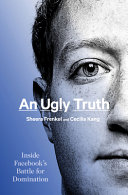

An Ugly Truth delves into how Facebook's leadership, particularly Mark Zuckerberg, prioritized growth and profit over ethical considerations. The book illustrates a timeline of decisions made by Facebook that led to a culture where ethical dilemmas were often brushed aside. This deterioration of ethical standards is portrayed through various incidents, including data privacy breaches and the manipulation of user data for advertising. The authors argue that this focus on growth at all costs not only compromised user trust but also led to significant societal repercussions, such as the spread of misinformation and the polarization of public discourse. The book emphasizes the need for accountability in tech companies and raises questions about the responsibilities of leaders in maintaining ethical practices.
Continue readingThe narrative highlights the crucial role of whistleblowers in exposing the internal workings of Facebook. The authors detail the stories of individuals who, despite facing potential backlash, chose to speak out about unethical practices within the company. These whistleblowers provided key insights into the company's operations and the culture of silence that often pervaded the organization. Their accounts serve as a reminder of the importance of transparency and the moral courage required to challenge powerful institutions. The book argues that whistleblowers are essential in holding companies accountable and fostering a culture of integrity, particularly in industries that wield significant influence over society.
Continue readingAn Ugly Truth discusses the broader implications of Facebook's practices on society, particularly regarding the impact of social media on public discourse and mental health. The authors explore how the platform has contributed to the spread of misinformation, hate speech, and divisive content, which have significant consequences for democracy and social cohesion. They argue that Facebook's algorithms, designed to maximize engagement, often promote sensationalism over accuracy, leading to a distorted perception of reality among users. The book also touches on the psychological effects of social media usage, including issues related to self-esteem and mental health, underscoring the urgent need for a reevaluation of how social media platforms operate and their influence on society.
Continue readingThe authors delve into Facebook's business model, which is centered around surveillance capitalism—where user data is collected, analyzed, and monetized. This model raises significant ethical concerns, as it often involves the manipulation of user behavior for profit. The book explains how Facebook's reliance on targeted advertising and data-driven decision-making has created a system that prioritizes profit over user privacy. The implications of this model extend beyond Facebook, as it reflects a broader trend in the tech industry where companies exploit personal data for commercial gain. The authors argue for the necessity of regulatory frameworks that protect user privacy and promote ethical data practices.
Continue readingAn Ugly Truth addresses the challenges associated with regulating powerful tech companies like Facebook. The authors discuss the complexities of creating effective regulations that can keep pace with the rapid evolution of technology. They highlight the difficulties faced by lawmakers in understanding the intricacies of social media platforms and the potential unintended consequences of regulatory measures. The book advocates for a collaborative approach between tech companies, regulators, and civil society to develop comprehensive policies that address the ethical and societal implications of social media without stifling innovation. This discussion emphasizes the need for ongoing dialogue and adaptive regulatory frameworks that can respond to the changing landscape of technology.
Continue readingThe book concludes with reflections on the future of social media and the potential paths forward for platforms like Facebook. The authors suggest that for social media to regain public trust, companies must prioritize transparency, user privacy, and ethical practices. They call for a shift in the industry towards more responsible business models that value user well-being over profit. Additionally, the book emphasizes the importance of user agency, advocating for tools and features that empower individuals to control their online experiences. The future of social media, as envisioned by the authors, involves a balance between innovation and ethical responsibility, ensuring that platforms serve the public good.
Continue readingAn Ugly Truth stresses the significance of public awareness regarding the practices of tech companies. The authors argue that an informed public is essential for holding companies accountable and advocating for ethical standards. They encourage readers to critically assess the information they consume and understand the implications of their online behaviors. The book highlights the role of education in fostering digital literacy, enabling individuals to navigate the complexities of social media and make informed choices. By raising awareness about the ethical challenges posed by platforms like Facebook, the authors hope to inspire collective action towards creating a more responsible and equitable digital landscape.
Continue readingThe reading time for An Ugly Truth depends on the reader's pace. However, this concise book summary covers the 7 key ideas from An Ugly Truth, allowing you to quickly understand the main concepts, insights, and practical applications in around 21 min.
An Ugly Truth is definitely worth reading. The book covers essential topics including The Deterioration of Facebook's Ethical Standards, The Role of Whistleblowers, The Impact of Social Media on Society, providing practical insights and actionable advice. Whether you read the full book or our concise summary, An Ugly Truth delivers valuable knowledge that can help you improve your understanding and apply these concepts in your personal or professional life.
An Ugly Truth was written by Cecilia Kang, Sheera Frenkel.
If you enjoyed An Ugly Truth by Cecilia Kang, Sheera Frenkel and want to explore similar topics or deepen your understanding, we highly recommend these related book summaries:
These books cover related themes, complementary concepts, and will help you build upon the knowledge gained from An Ugly Truth. Each of these summaries provides concise insights that can further enhance your understanding and practical application of the ideas presented in An Ugly Truth.